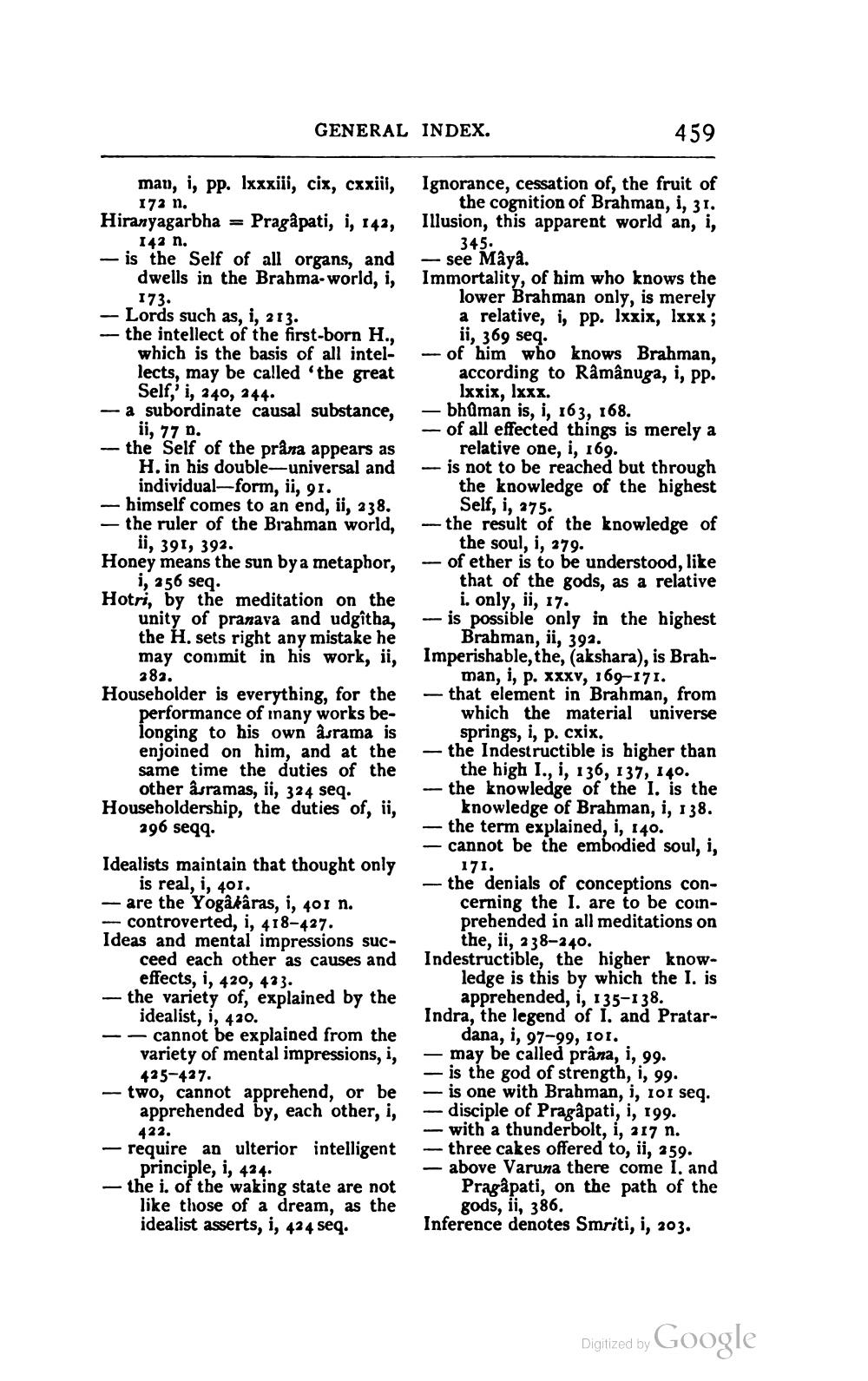________________
GENERAL INDEX.
man, i, pp. lxxxiii, cix, cxxiii,
172 n.
Hiranyagarbha
Pragâpati, i, 142,
142 n.
- is the Self of all organs, and dwells in the Brahma-world, i, 173.
-Lords such as, i, 213.
- the intellect of the first-born H., which is the basis of all intellects, may be called 'the great Self,' i, 240, 244. -a subordinate causal substance, ii, 77 D.
-the Self of the prâna appears as H. in his double-universal and individual-form, ii, 91.
- himself comes to an end, ii, 238. the ruler of the Brahman world, ii, 391, 392.
-
Honey means the sun by a metaphor, i, 256 seq. Hotri, by the meditation on the unity of pranava and udgîtha, the H. sets right any mistake he may commit in his work, ii,
282.
Householder is everything, for the performance of many works belonging to his own âsrama is enjoined on him, and at the same time the duties of the other âsramas, ii, 324 seq. Householdership, the duties of, ii, 296 seqq.
Idealists maintain that thought only is real, i, 401.
- are the Yogâkâras, i, 401 n. -controverted, i, 418-427. Ideas and mental impressions sucIceed each other as causes and effects, i, 420, 423.
- the variety of, explained by the idealist, i, 420.
cannot be explained from the variety of mental impressions, i, 425-427.
-two, cannot apprehend, or be apprehended by, each other, i,
459
Ignorance, cessation of, the fruit of the cognition of Brahman, i, 31. Illusion, this apparent world an, i, 345 - see Mâyâ.
Immortality, of him who knows the lower Brahman only, is merely a relative, i, pp. lxxix, lxxx; ii, 369 seq.
- of him who knows Brahman, according to Râmânuga, i, pp. lxxix, lxxx.
- bhuman is, i, 163, 168. - of all effected things is merely a relative one, i, 169.
422.
require an ulterior intelligent principle, i, 424.
-the i. of the waking state are not like those of a dream, as the idealist asserts, i, 424 seq.
-
- is not to be reached but through the knowledge of the highest Self, i, 275.
-the result of the knowledge of the soul, i, 279.
of ether is to be understood, like that of the gods, as a relative i. only, ii, 17.
- is possible only in the highest Brahman, ii, 392. Imperishable, the, (akshara), is Brahman, i, p. xxxv, 169-171. - that element in Brahman, from which the material universe springs, i, p. cxix.
the Indestructible is higher than the high I., i, 136, 137, 140. - the knowledge of the I. is the knowledge of Brahman, i, 138. the term explained, i, 140. cannot be the embodied soul, i,
171.
-
-
the denials of conceptions concerning the I. are to be coinprehended in all meditations on the, ii, 238-240.
Indestructible, the higher knowledge is this by which the I. is apprehended, i, 135-138. Indra, the legend of I. and Pratardana, i, 97-99, 101.
may be called prâna, i, 99. is the god of strength, i, 99. is one with Brahman, i, 101 seq. disciple of Pragâpati, i, 199. with a thunderbolt, i, 217 n. three cakes offered to, ii, 259. above Varuna there come I, and Pragâpati, on the path of the gods, ii, 386. Inference denotes Smriti, i, 203.
—
Digitized by Google




